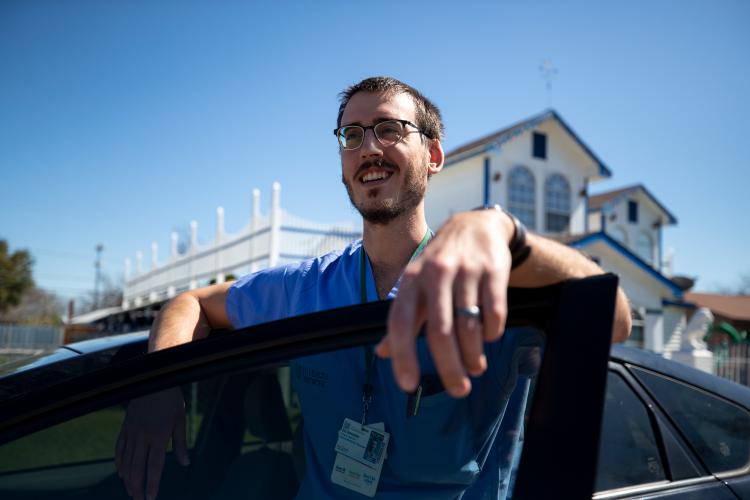
Dr. Andrew Saverine has only been a full time physician at JPS Health Network for a few months, but he’s already made a huge impact on how care is delivered to patients.
Saverine was selected as a Family Medicine resident at JPS in 2016, largely because of his dedication to helping underserved patients. During his residency interview, he pitched the creation of an outreach program through which he hoped to identify frequent Emergency Department visitors. He’d then help shepherd them to a situation where they established a relationship with a primary care physician and made regular doctor visits to better maintain their health.
When he was hired at the end of his residency program last summer, Saverine was given the freedom to launch his dream program. He didn’t hesitate.
“It’s amazing to be able to pursue my passion and make that my actual job,” Saverine said. “It’s very gratifying to be able to make a difference in the life and health of people. Sometimes you can’t see the difference you make, but I am very fortunate that, in many cases, I can really tell the difference as these patients get well.”
Called the Intensive Primary Care Program, Saverine scours JPS Emergency Department records searching for people who use emergency care as an alternative to seeing a regular doctor. Not only does that help patients stay healthier by getting a handle on health issues before they spiral out of control, it helps use precious space and resources in the Emergency Department more efficiently.
One of Saverine’s patients, Donald Snell, was in denial about his health despite around-the-clock coughing fits, a heart issue that caused swelling so bad he couldn’t get his shoes on his feet or find the strength to walk across his apartment. He had sores all over his body from lying in bed all day. Snell’s wife, Bessie, said she finally got him to go to the emergency room where he got some medicine that improved his health quite a bit. But Bessie said she doesn’t think her husband, who also suffers from memory loss due to dementia, would have gotten better without Saverine’s outreach program.
“I couldn’t get him to go to go see a doctor,” Bessie said of Donald. “To have Dr. Saverine come to us to help get him straightened out makes all the difference in the world. Before we met Dr. Saverine, my husband sat on the couch and watched television all day because he couldn’t really get around. Now he is able to do a lot of the little things around the house that people don’t think much of – until they can’t do them.”
During his last visit, Saverine was a bit concerned he’d missed his connection with the patient because Donald didn’t answer the intercom when Saverine paged him from the apartment gate. Saverine was happily surprised to discover Donald was out of his apartment because he made the trip to take out his garbage, descending and climbing back up two flights of stairs in the process.

This is the perfect job for me, I really love it. When you can help someone and see that you’re making a difference, I don’t think it gets any better than that.

Saverine said he’s excited to be able to make a difference by breaking the tradition of doctors staying at the hospital and relying on patients to make it to him. He hopes someday soon that JPS will have a whole team of physicians reaching out into the community. It’s a model that has impressed Dr. G. Robert Stephenson, MD, Chief Quality Officer at JPS.
“Dr. Saverine is what is called an extensivist,” Stevenson said. “He takes care of patients with lots and lots of health problems and tries to manage them on an outpatient basis. He’s done a remarkable job in a short amount of time.”
Stephenson said Saverine’s outreach program gets care to patients who were falling through the cracks in a much more efficient and cost effective way than could happen if they continued to visit the emergency room every time they had a health issue. Instead of only getting care when their health worsens, these patients are actually getting better, said Stephenson who added that he hope’s Savarine’s program is expanded in the future.
Besides his signature outreach efforts, Stephenson said Saverine is making an impact in other areas, too. The up and coming physician identified an issue that will save lives of patients in the future.
According to Stephenson, a JPS patient was sent to a nursing home for long term care after being treated in the hospital for an infection. Mysteriously, the person was on the upswing when they left JPS but became sicker under nursing home care. Saverine noticed, after reviewing the person’s records that he was supposed to be receiving IV antibiotics at the nursing home. But, because IV drugs aren’t usually administered outside the hospital setting, discharge papers automatically eliminated them from the list of prescribed medications patients are supposed to receive.
“It was a good catch of a policy that needed to be changed,” Stephenson said. “A lot of young doctors might be afraid to speak up about something like that. We’re glad Dr. Saverine is willing to stand up and advocate for patients.”
Saverine said working with patients who can’t find help elsewhere is the greatest reward of his job.
“This is the perfect job for me, I really love it,” Saverine said. “When you can help someone and see that you’re making a difference, I don’t think it gets any better than that.”
